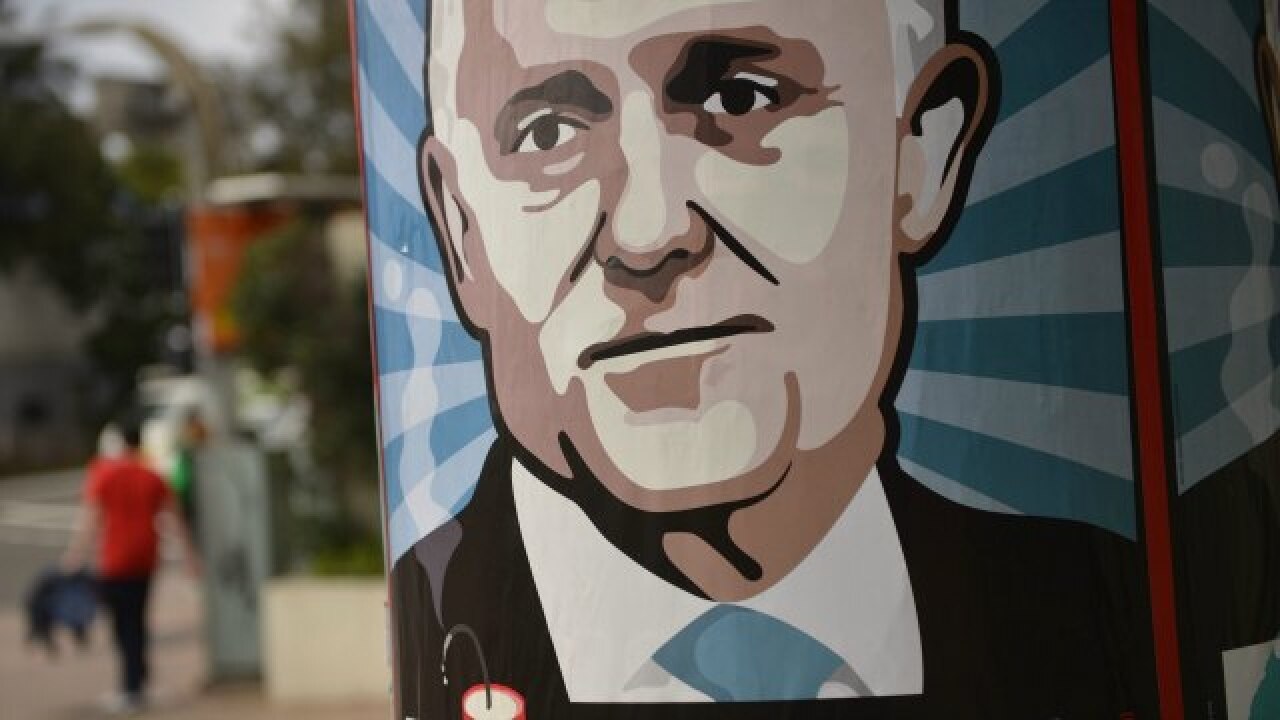
Australia: pm malcolm turnbull scrambles for independent votes as race tightens
- Select a language for the TTS:
- UK English Female
- UK English Male
- US English Female
- US English Male
- Australian Female
- Australian Male
- Language selected: (auto detect) - EN
Play all audios:

Turnbull's gamble in calling an election backfired badly with a much bigger swing to the centre-left Labor opposition than expected A poster of embattled Australian Prime Minister
Malcolm Turnbull created by Sydney artist Michael Agzarian is seen on a street in Sydney on July 6, 2016. Australian Prime Minister Malcolm Turnbull scrambled on Thursday to gain support
from a small handful of independent lawmakers whose backing he will likely need to form a workable government and end a political vacuum after an unexpectedly close election. There were
signs that the instability was beginning to take its toll on the Australian economy, with Standard and Poor's cutting Australia's credit rating outlook to negative from stable,
threatening a downgrade of its coveted triple A status. The Australia dollar fell half a US cent after S&P's announcement, which cited concerns the coalition government would be
hampered in its plans to return to budget surplus as it struggles to form a majority government. "I think what the Australian people want to be assured of today is that there is a clear
plan, should we be able to form government, to maintain the fiscal health of this country and that is what the agencies are saying is necessary," Treasurer Scott Morrison told
reporters soon after the S&P announcement. Turnbull flew to northern Queensland state on Thursday to meet independent lawmaker Bob Katter, a former member of Turnbull's conservative
coalition whose vote has emerged as critical to delivering the 76 lower house seats the embattled prime minister needs to form a new government. Turnbull's gamble in calling an
election, ostensibly to clear the upper house Senate of what he saw as obstructive minor parties, backfired badly with a much bigger swing to the centre-left Labor opposition than expected.
Minor parties and independents have emerged in an even more powerful position, making it less likely Turnbull will be able to push his reformist economic agenda, which includes a A$50
billion ($37.6 billion) corporate tax break over 10 years, through an intransigent upper house. Turnbull, who has even faced calls from within his own party to resign since Saturday's
election, will now need the support of minor parties and populist independents in both the Senate and the lower House of Representatives. That means senators like the maverick Katter and
Nick Xenaphon from South Australia state have emerged as potential kingmakers with team members in both houses. Two other lower house independents, Andrew Wilkie and Cathy McGowan, have
ruled out any deals with the government. "I can just say to you that I am very confident, very confident indeed that we will form government, form a majority government in our own
right," Turnbull told reporters before meeting Katter. "But I am of course talking to the crossbenchers as well, as I would do regardless of what our own numbers in the house
amounted to," he said. Vote counting is now focused on the 1.5 million postal and absentee votes and the process could still drag on for days, or even weeks. "It's genuinely
50-50," said respected_ Australian Broadcasting Corporation (ABC)_ political analyst Antony Green. The latest _ABC _projections gave Turnbull's coalition 72 seats, with Labor on
67. The government picked up one more seat overnight but seven remain too close to call. Turnbull, even as he searches outside the coalition for support, also finds himself fighting a
rearguard action for the ultra-conservative wing of his own Liberal party led by Senator Corey Bernardi.
